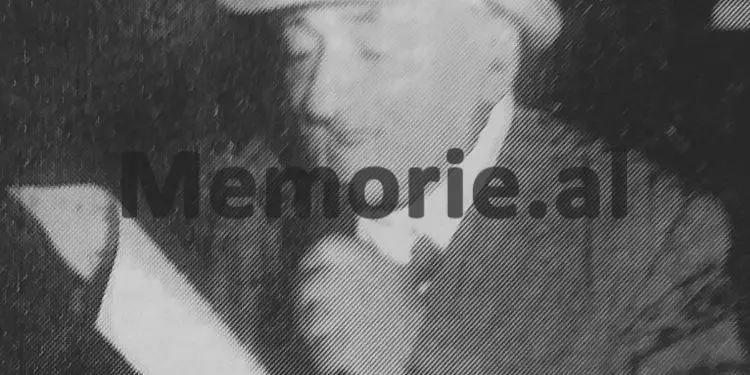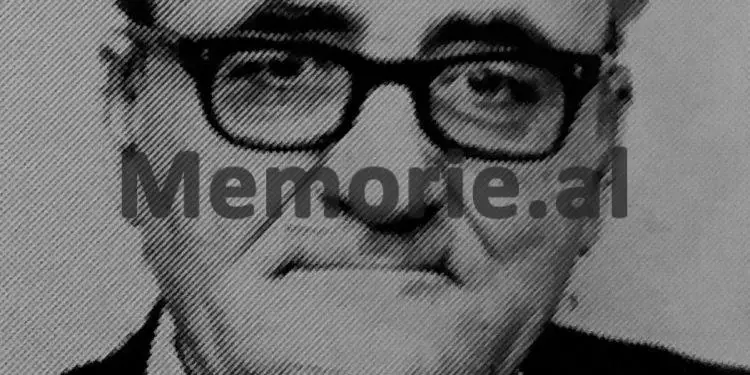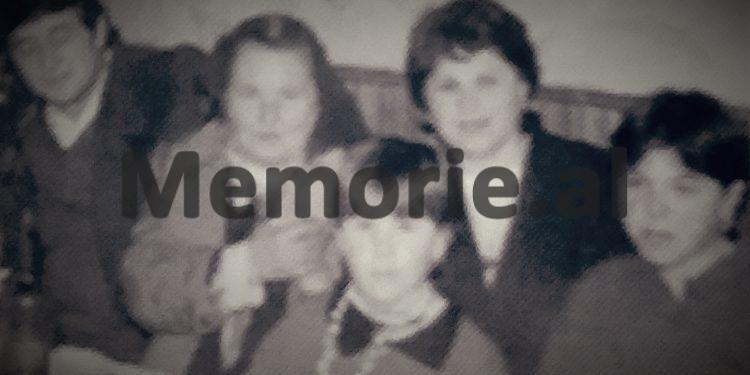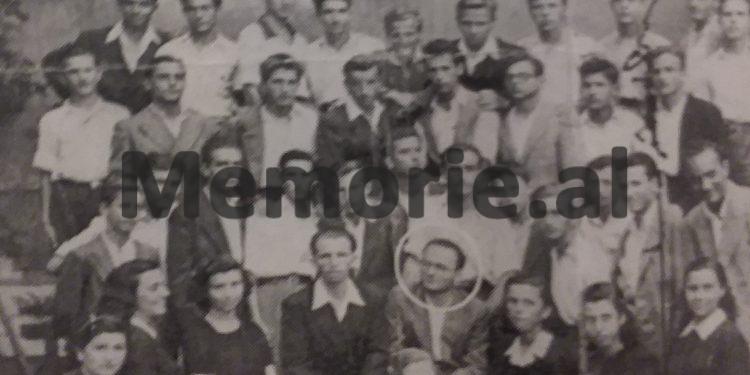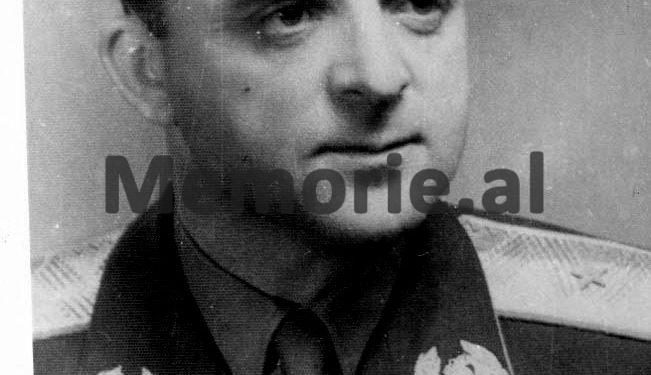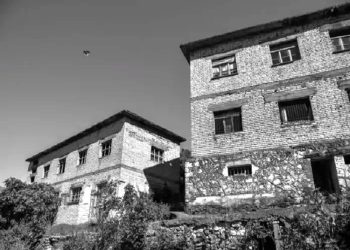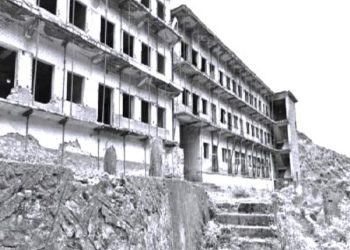Dashnor Kaloçi
Memorie.al publishes the unknown story of Gjergj Komnino, originally from the village of Mbrezhdan in Këlcyra, who after studying Literature at the University of Florence, became a partisan during the occupation, serving as a translator at the General Staff of Enver Hoxha. where he refused to print and typograph tracts calling for a fratricidal war between Albanians. After the end of the war he graduated in Zagreb and for many years worked at the Folklore Institute, until 1956 he wrote a letter to the UN, where he denounced the crimes of the communist regime of Enver Hoxha and after that he was arrested by the State Security. being sentenced first to death and then to 25 years, of which he suffered 15 years in the prisons of the communist dictatorship living only on prison soup and without any assistance. After his release from prison, he “stabilized” in a basement at the Shallvar palaces, where stray dogs gathered, and to survive, he only went out at night and collected paper and cardboard in the trash.
“During an expedition in the highlands of Tirana in 1956 where his father had gone to collect folklore, in the village of Shëngjergj he saw with his spear the terror of police forces and those of the State Security who under the pretext of collecting weapons and taxes, had gathered the people in the village mosque beating them en masse. The father could not stand the humiliating scene inflicted on those broken villagers, and the next day he went back to where he had gathered their testimonies of the inhuman beatings inflicted on you. Later, through a letter of protest written in French, the father made them known to the UN, highlighting the miserable condition of the Albanian people. “This letter fell into the hands of the State Security, which immediately arrested him.” Emine Komnino Kushi, resident in the city of Durrës, the daughter of Professor Gjergj Komnino, researcher, publicist, translator of the poet, testifies for Memorie.al, the creepy story of her father, who had studied in Florence and Zagreb, then as an employee Scientist of the Institute of Albanian Studies, who after a denunciation letter he sent to the UN, where he pointed out the misery of the Albanian people, ended up in 15 years of communist regime prisons and when he came out of prison to ensure a minimum living, he collected letters of cardboard in the garbage bins of the streets of Tirana.
George and the Komnino tribe
Gjergji was born on February 15, 1919 in the village of Brezhdan in Këlcyra, whence the origin of his family, which comes from the great Komnenian tribe of Gjergj Araniti Komnenit (Topia), the prince of Vlora and Kanina, who shortly after Skanderbeg’s return to Kruja broke the Ottoman army on the battlefield for the first time. From this large door is said to flow Ana Komnena, the sister of Emperor Alex Komnenos, who in the story she wrote about her brother, mentions for the first time the Arbëresh who fought bravely against the Normans in Durrës. The Komninaj house lies on the edge of a large rock in the village of Brezhdan, which is still known today as the Komninaj rock, Gjergji’s father was engaged in trade and after he was somewhat adjusted by the economic situation, he moved his family from the village and settled in Përmet, where he intended to educate the children. Gjergji finished primary school and at the age of 10 published the first poem entitled “Valo flamur”. He continued his high school education in the city of Gjirokastra and then in the Normal High School in Elbasan. After graduating as a teacher, Gjergji was assigned to teach at the primary school in Fier and then in Ballsh.
In Florence, study for Naim
In 1941, with a great desire to study Albanian Literature, Gjergj Komnino left for Italy after securing a right to study at the Faculty of Literature at the University of Florence. While a student, he was engaged in the study of “Naimi- the poet man” which was conceived as a tragedy in verse. Gjergji showed this poem to an Italian scholar named Angelo Leoti, who was the author of a voluminous Albanian-Italian dictionary, who recommended Gjergji’s poem about Naim to the Marzzocce Publishing House, one of the most famous houses in Italy. which evaluated the work of the student from Albania as one of the most dignified works of Albanian literature of that time. After that, Gjergji completed another study on De Rada entitled “II romanticism precoce nelle di De Rada”. Gjergji failed to complete his studies in Florence, because after the first two years, at the beginning of 1943, he left them to return to Albania, where he joined the ranks of the anti-fascist resistance in the Gjirokastra Region and near the Headquarters of General partisan of Enver Hoxha, where he performed the task of translator.
Translator at Enver Hoxha’s Headquarters
One of the students of Gjergj Komnino, a well-known publicist and writer after the ’90s, Agim Musta, who had the opportunity to spend several years in the prisons of the communist regime with his former high school professor “Qemal Stafa”, Among other things, he testified: “After stopping his studies in Italy, Gjergji came to Albania and became a partisan in the area of Zagoria in Gjirokastra. About this he told me: together with my friend, Temo Mandili, they covered the agit-prop sector by publishing tracts and preparing theatrical performances. One day our staff commissar, Shemsi Totozani, came to our office and gave us a tract to print, which he had drafted himself. I glanced at the tract and was shocked by what was written there. It was written in the medieval language, because it said: Arise, you Christians of Dropull, Progonat and Vurg and fall to the aghallars of Gjirokastra and the beys of Delvina and Libohova. Get up and plant the ballistic Muslim caterpillars, which have sucked your blood … ‘! I could not believe my eyes and decided to reread the tract. Then I said to Temos, if we had gone out to fight the occupier, or to make a crusade?! He did not open his mouth but stood deaf. After a few hours Shemsiu came to get the typed tract. I told him that I had not suppressed that its content was contrary to our ideals. He became nervous and ordered the partisans to arrest me. They tied me with a rope to an animal cellar and I would probably be shot, as if in those moments the order of the General Staff in Labinot, where I was transferred to that Headquarters, did not come. There I was assigned the task of translating communist political literature. Having been at that headquarters for several months, I had the opportunity to learn secret orders and instructions that were given more orally to partisan units and liberated areas. Those orders were given personally by Enver Hoxha, Miladin Popovic and Vukmanovic Tempo. Convinced that the ordinary partisans who shed blood in the war knew nothing at all about the behind-the-scenes that were being woven, I used the pretext of the eyes to get away from that headquarters.
Graduated in Zagreb
After the end of the war, Gjergji was appointed to the Institute of Albanian Studies (the predecessor of the Academy of Sciences) together with prof. Eqerem Çabejn, Selaudin Toton etc. In 1946, he was sent to Zagreb to complete his university studies, which he had discontinued in Florence. At the University of Zagreb, he met two well-known albanologists, Petar Skok and Baric, who were very interested in the study of the etymology of Albanian. Based on this, Professor Skoku requested that Albanian be taught in that faculty and after submitting and approving his project to the council of professors, he charged Gjergj with that task. At the end of the studies, by the leaders of the faculty, Gjergji was charged to defend the diploma with the work “L’uomoe la societa sdi Luigi Pirandelo”, a topic which had the maximum evaluation by the commission, which gave it and viston to be published. After the breakdown of relations with Yugoslavia, like many other students, Gjergji returned to his homeland where he was assigned to work at the Scientific Institute (Popular Culture), in the Folklore sector. In this work he had the opportunity to go to almost all the provinces of the country to collect rare words, toponyms, anecdotes, tales, etc.
Writes to the UN, arrested
While Gjergji was working at the Folklore Institute, something happened to him that would completely change the course of his life. Regarding this, his daughter Eminja recalls: “During an expedition in the highlands of Tirana in 1956, where the father had gone to collect folklore, in the village of Shëngjergj, he saw with his own eyes the terror of the police forces and those of the State Security which under the pretext of collecting weapons, had gathered the people in the village mosque by beating them en masse. The father, unable to bear that humiliating scene, went there again the next day to gather the testimonies of those broken villagers who had been brutally beaten. He then wrote a letter to the UN (in French) denouncing the actions of the Albanian state towards its citizens and the miserable economic situation in which the country was. Although he was convinced of the consequences of that letter, which could have cost him his life, he did not back down from his decision. This letter fell into the hands of the State Security, which immediately arrested the father. General Nevzat Haznedari, his former friend of the Elbasan Normal, told him: ‘We have been waiting for a long time, but you came by yourself’. Colonel Rexhep Kolli, on the other hand, told you: ‘We will now give the bullet that we could not give during the war with interest’. As if the State Security was not satisfied with his arrest, he also arrested my mother, Veronica, who was then pregnant with her brother, who would be born a little later. “In court, the father was sentenced to death, but then she was reduced to 25 years in prison, and the mother, after staying in the cell for six months, was forced to release her because she was on the verge of giving birth to her brother, who was named Lirim.”
15 years in prison
The writer, scholar and translator, Gjergj Komnino, after serving a letter of denunciation to the UN, began serving his sentence in the prisons of the communist regime. Regarding this accomplice, Agim Musta, among other things, recalled: “Professor Gjergji wandered for 15 years, crawling from one prison to another, without any help. No one took care of him to cure him, but they demanded work and fulfillment of the norm. The guards and officers mocked him with various epithets and often tied him with rope to poles in the middle of the heat, making his mental state worse. With the turban on his head and the straining of books around his neck, he talked for hours about Piron, Plato, Aristotle, Confucius, Kant, Croce, and other philosophers, taking a picture of the biblical preacher. After suffering for 15 years alone with prison soup, he was released in 1972 with a collection of illnesses and deep psychic shocks. The “people’s power” did not give him a pension or any other job, and there was no question of cure. He was left to die on the streets of Tirana, as an example of horror. He took refuge in an abandoned basement at the Shallvar palaces, where stray dogs gathered on cold winter nights. To stay out of the sight of the people in power, he would go out from there only at night and with his head tied to the turban, so that no one would recognize him, he would collect papers and cartons in the garbage cans to ensure his survival. The doors of the libraries slammed in his face and the bread sellers had been ordered not to supply him, as he was considered a parasite. The people of power and the State Security, when they saw Gjergj, laughed at the alienation they had done to him, after they had achieved their goal, terrifying others as well. In 1991, with the fall of the communist regime, Gjergji was surprisingly rehabilitated and from his mental state participated in the demolition of the dictator’s monument and hunger strikes. He also wrote a program to create a political party for former political prisoners, calling them the real opposition. On March 5, 1991, he left Durrës for Italy on a refugee boat. There he gave numerous interviews and published some of his works, winning a silver medal in 1993 in poetry. Due to a life full of suffering and endless vicissitudes, Gjergj Komnino passed away in 1996, near Rome and apart from his wife and two children at his funeral were only the nuns of the assembly “, testified Agim Musta on the tragic fate of the former his professor, Gjergj Komnino, the famous scholar who in addition to studies on Naim and De Rada, wrote over 40,000 verses in poetic prose and filed a good piece of folklore when he was at the Institute of Popular Culture that never saw the light of day. publication./Memorie.al




